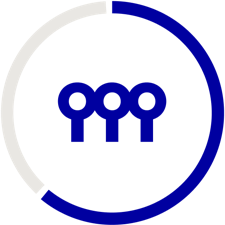How we Evaluate and Rate Brands
Commons' sustainability experts cut through the greenwashing so you can spend with intention and power a sustainable future.

Our Rating Scale
We rate brands based on how much they're contributing to a sustainable economy.
Best
Throughout their supply chains, Best brands take responsibility for their impact on people and the planet. They're sustainability leaders in their industries, doing more than their fair share.
Good
These brands are exceeding expectations by actively reducing their carbon footprint and minimizing waste.
Fair
These brands are meeting the minimum sustainable efforts we'd expect from a company their size.
Poor
Medium-to-large brands are rated Poor if they have fewer sustainability practices than we'd expect of a brand their size. Small brands are rated Poor if they lack public reporting on sustainability goals or efforts.
Harmful
Harmful brands are far from meeting the minimum sustainability efforts and reporting that we'd expect from them. Their business and manufacturing practices often harm ecosystems and employees.
Our Criteria
Our criteria focus on the root causes of the climate crisis. We ask these questions to determine how brands are building more sustainable industries.

Resources
How is this brand using sustainable materials, ingredients, packaging, and shipping to reduce its impact?

Slow Consumption
Does this brand encourage circularity and conscious consumption?

Accountability
Is this brand transparent about how it's working towards a more sustainable industry?
Our Methodology
We empower people to get what they need by buying less and buying better. When we shop, we use our dollars to support brands that are actively building more sustainable economic systems.

Transparency first
Our team of carbon experts use publicly available reports and information to evaluate, summarize, and rate each brand.
Scaled accountability
Big brands have a larger impact and more resources to invest in sustainable practices, so we rate them against higher expectations.
Adaptable framework
As brands evolve, so do our ratings. Each brand rating is date-stamped based on its latest update. We always welcome questions and feedback.
Our Impact
Over 100,000 people use the Commons app to make measurable progress through sustainable spending.

In 2023, 61% of people using Commons reduced their carbon emissions after joining the app
The average Commons user reduced their annual carbon footprint by 19%.
If every American reduced their annual emissions by 19%, we would save over 1 billion tons of CO₂e. That’s like taking 80% of cars off the road for a year.
FAQs
How does Commons make money?
How does Commons make money?
Brands are independently evaluated and rated by our carbon experts. When you buy through our links, we may earn a commission. We evaluate each brand independently. Affiliate partnerships in no way influence our brand ratings or reviews.
When you purchase offsets for flights, gifts, or through Commons’ Climate Stewardship subscription, Commons charges a 20% transaction fee to cover the costs of our time-intensive evaluation and monitoring processes. This is standard for offset providers.
Who's behind Commons?
Who's behind Commons?
We’re a small team of carbon experts, data scientists, engineers, writers, and designers passionate about making sustainable living more accessible. Our Founder & CEO, Sanchali Pal, started tracking her carbon footprint in an Excel spreadsheet over 10 years ago because she couldn’t find any good tools to align her life with the world she wanted to live in. You can read more about us here.
Commons has raised $13.5 million in funding. Our investors include Sequoia Capital, climate investors Amasia and Norrsken, and the founders of Headspace, Fitbit, Candy Crush, and Nest. Commons has also received funding from public figures like Maisie Williams and Jay-Z’s Arrive. The company’s starting capital came from grants from Harvard and MIT.
Why are some brands unrated?
Why are some brands unrated?
Our small team manually evaluates brands, focusing first on the biggest, most popular brands, well-known sustainable options, and some smaller sustainable brands. We have hundreds more brands on our list.
If you see an unrated brand, you can click the 'Request' button to help bump this brand to the top of our to-do list.
What are auto-generated ratings?
What are auto-generated ratings?
Auto-generated ratings are based on the same criteria as our Expert Ratings, but with less in-depth analysis.
All of our brand ratings (expert and auto) are based on publicly available information and graded based on our category-specific rubrics. Expert ratings include human analysis and verification at the scoring stage, whereas auto-generated ratings rely on AI analysis of brand claims.
If you read an auto-rating and would like a more in-depth Expert rating, you can request one on the brand’s page.
Why do some brands have a partial rating?
Why do some brands have a partial rating?
When a brand doesn't provide substantial public sustainability information, our team gives it a partial rating. You may see partial ratings on child brands of large corporations if there is no brand-specific reporting available, or any other brands with insufficient sustainability reporting.
How does Commons compare small brands to large brands?
How does Commons compare small brands to large brands?
A company’s size indicates how much resourcing and influence it has. Large brands have access to more money and resources to improve sustainability efforts, which is why we hold them to a higher standard by making scoring more rigorous. Here’s how we determine company size:
- Small companies: Less than 500 employees and/or under $150m annual revenue
- Large companies: More than 500 employees and/or over $150m annual revenue and/or publicly listed
How does Commons use AI?
How does Commons use AI?
AI (artificial intelligence) has opened up vast possibilities for creating and computing, but it comes with a hefty environmental toll and can include inaccuracies, so we don’t use it lightly. We are actively taking steps to track and account for our company-wide AI usage using best-in-class data and research. We’ll report on our AI emissions in our upcoming annual impact report.
In addition to small-scale usage on a team-by-team basis, we use AI to filter through vast amounts of publicly available brand information and surface relevant resources as part of our research and analysis for brand ratings.
Browse by category
Get Rewards
Earn for sustainable purchases
Commons rewards you for sustainable purchases from all our Top Rated brands, plus thousands of everyday purchases — from thrift stores to public transit.
Learn more about rewards ->
























